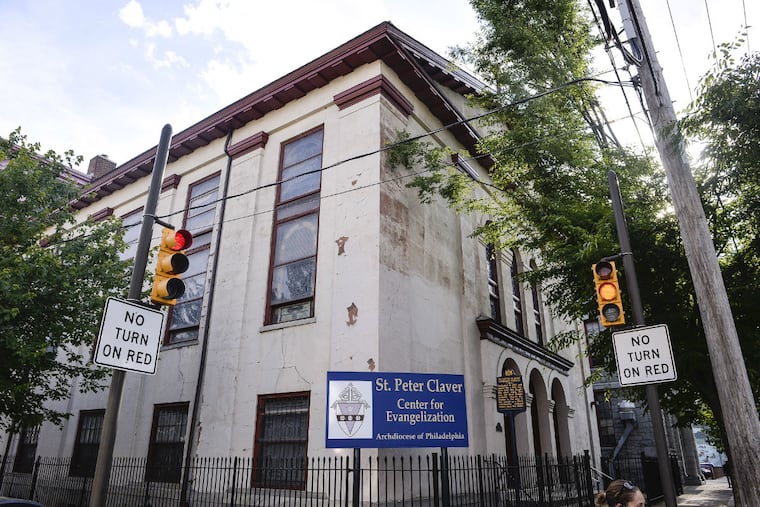Battle over proposed sale of first black Catholic church intensifies
Already heartbroken that the city's first black Catholic church, St. Peter Claver, may soon be for sale, former parishioners were dismayed when a lawyer for the Archdiocese of Philadelphia mispronounced the name of the historic icon during a court hearing last week.

Already heartbroken that the city's first black Catholic church, St. Peter Claver, may soon be for sale, former parishioners were dismayed when a lawyer for the Archdiocese of Philadelphia mispronounced the name of the historic icon during a court hearing last week.
"Oh, it's a dagger in the heart to hear that," said advocate Faye Anderson after Nina Stryker, an attorney for the archdiocese, pronounced "Claver" as rhyming with cadaver instead of with flavor.
The gaffe was interpreted as a sign of insensitivity by the archdiocese toward black Catholics fighting to avert what they see as the irretrievable loss of their mother church at 12th and Lombard Streets and a vital cultural symbol.
For their part, church officials say they understand the angst.
"It's a very difficult issue and there's a lot of love and history there, and people want to see it preserved," said Deacon Tom Croke, director of property services for the archdiocese. "Folks are emotional."
Archdiocesan officials said a sale of the already-shuttered church and its adjacent buildings would provide much-needed revenue.
To clear the way for that, however, the archdiocese needs to address restrictions in a deed governing the church's former school building, now a women's shelter called Women of Hope, Croke said.
Discussion of the deed and related issues brought the matter to court last week as 40 African American Catholics packed a hearing in Philadelphia Orphans' Court to decry plans for the proposed sale.
"I want to see the church buildings remain," said John Mackin, 73, of Center City, who used to worship at St. Peter Claver. "I'm angry, confused, and puzzled about its loss."
Opponents of the sale say they want the church to be reopened and allowed to grow as a fully functioning parish.
The original deed for the property specified that "the premises are to be used as a Church for Colored People, parsonage, and school attached thereto; white people, however, being permitted to attend all religious services [and] to receive the sacraments of Penance & Eucharist in the said church."
The archdiocese wants to clear any restrictions created by the deed, "to make the eventual listing for sale less cumbersome," said Patrick Grossi, advocacy director for the Preservation Alliance for Greater Philadelphia. The alliance is closely watching the matter in case it is later called on to help negotiate use of the property after a sale, Grossi said.
The deed doesn't apply to the church sanctuary, Croke said.
If a sale goes through, the archdiocese says it will offer one-third of the proceeds to the archdiocesan Office for Black Catholics.
Opponents of the sale say the archdiocese did not give parishioners or the public adequate notice of its effort to remove the deed restrictions, nor did it provide information about where and how people could object.
"It's really sneaky and underhanded what they did," said Margot Osorio, 52.
"The archdiocese was very public about the intention to market the property," countered archdiocese spokesman Ken Gavin.
At the hearing, Administrative Judge Matthew Carrafiello said he would appoint a trustee to help look after the interests of former parishioners and opponents of the sale. Another court hearing is scheduled for later this month.
Much is at stake for St. Peter Claver, whose church building, as well as school building and rectory, are designated historic by the Philadelphia Historical Commission, according to Jonathan Farnham, the commission's executive director.
The church opened in 1886 to minister to black Catholics - former slaves, free blacks, and immigrants from Haiti, Africa, and elsewhere.
Black parishioners of the 19th century had rejected the discrimination they had suffered in the city's predominantly white Catholic churches. St. Peter Claver Church was named after a Spanish Jesuit priest who had been a missionary to 16th-century slaves in South America, according to the Historical Society of Pennsylvania.
The facility grew to include other buildings on the block.
During the church's 100th anniversary year in 1986, then-Cardinal John Krol announced that he would be limiting the functions of St. Peter Claver. Masses could still be held, but baptisms, marriages, and most funerals would no longer be performed.
He said gentrification had changed the community, as more whites moved into the neighborhood. A parish specifically for black Catholics was no longer necessary, he said, since St. Peter Claver was no longer serving its original purpose of ministering to the black community.
Between 1986 and 2014, the church was renamed the St. Peter Claver Center for Evangelization, a place for community outreach.
In 2014, the center was closed, the final Mass held on Sept. 9. Other churches provided for black Catholics, the archdiocese said.
"The direct result was the underutilization" of the center, Gavin said. He added that fewer than 15 people attended a monthly Mass at the center and programs there had been sparsely attended.
Keeping such a facility going "while the archdiocese is in reasonably dire financial straits" did not seem feasible, Croke said. "I simply don't know how to resolve this issue to their [former parishioners'] satisfaction."
He added that the archdiocese has recognized that "there is a lot of value in that neighborhood," and selling makes good fiscal sense. The church and its outbuildings are "an asset, and it's not doing anything," Croke said.
He went on to say that a developer in the area recently built and sold eight townhouses ranging from $1.2 million to $1.8 million apiece.
Administrators at the Women of Hope Shelter could not be reached. Should a sale occur, women there would be moved to an adjacent building, Gavin said.
215-854-4969
@AlfredLubrano